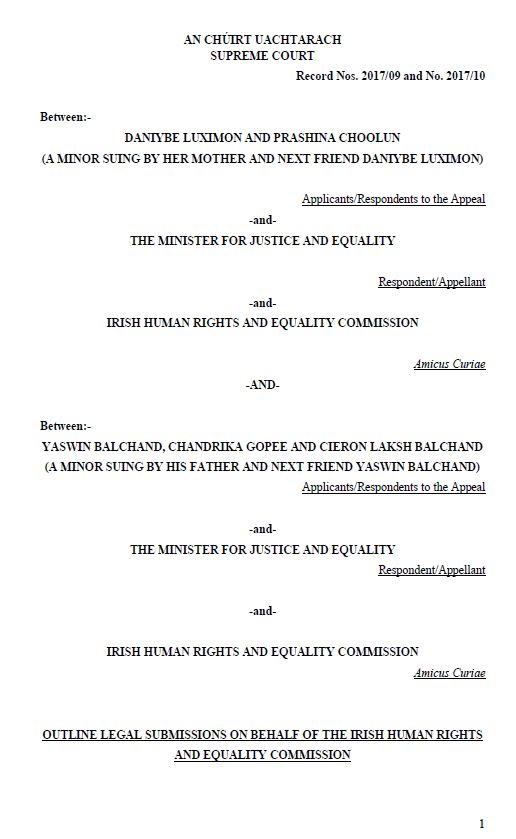Commission Exercises Amicus Curiae Role
The Irish Human Rights and Equality Commission (‘the Commission’) has today appeared before the Supreme Court as an amicus curiae (‘friend of the court’) in two cases concerning the rights of non-Irish families who have been permitted to work and study in the State.
The central issue is whether the Minister for Justice and Equality is required to have regard to the right to private and family life, as guaranteed by the Constitution and the European Convention on Human Rights (ECHR), in deciding whether to renew or vary the permission of the families concerned to be in the State.
The Commission in its submission to the Supreme Court, published today, has stated that the Minister for Justice and Equality is obliged to consider this right in making decisions on immigration status variations under the Immigration Act 2004.
The Commission further states in its legal submission that the Minister’s decision, which effectively determines whether or not the applicants are entitled to remain in the State, could interfere with their right to a private and family life, and to remain part of the community and society in which they have lived for a significant period of time.
The Commission previously appeared as amicus curiae in these proceedings before the Court of Appeal, which held in favour of the families concerned. The applications were made by two families from Mauritius who arrived in the State at a time when they originally did not require a visa, and who had subsequently been granted permission to remain in the State.
The Commission’s functions under the Irish Human Rights and Equality Commission Act 2014 include that of applying for liberty to appear as an amicus curiae before the superior courts in proceedings that involve, or are concerned with, human rights or equality rights.
Emily Logan, Chief Commissioner of the Irish Human Rights and Equality Commission stated:
“The Irish Human Rights and Equality Commission applied to appear as an amicus curiae in these cases involving these two families, as they raised important issues regarding the right to private and family life of those who have been permitted to live, study and work in the State for a considerable period of time.
“The public importance of the issues raised in these cases in clarifying the rights of those who have been working, contributing and living in communities with their families, and how they are now viewed by the State is potentially significant.”
ENDS/
For further information, please contact:
Brian Dawson, IHREC Communications Manager,
01 8589601 / 087 0697095
Follow us on twitter @_IHREC
Editor’s Note
The Commission’s written submissions are available at the following link:
The proceedings are:
- Luximon v Minister for Justice and Equality, Supreme Court record no 2017/09
- Balchand v Minister for Justice and Equality, Supreme Court record no 2017/10
The amicus curiae function of the Irish Human Rights and Equality Commission.
The Commission’s functions under the Irish Human Rights and Equality Commission Act 2014 include that of applying for liberty to appear as an amicus curiae (‘friend of the court’) before the superior courts in proceedings that involve, or are concerned with, the human rights or equality rights of any person.
Section 10 of the Irish Human Rights and Equality Commission Act sets out the functions of the Commission and Section 10(2)(e) provides that the IHREC shall have a function:
“to apply to the High Court or the Supreme Court for liberty to appear before the High Court or the Supreme Court, as the case may be, as amicus curiae in proceedings before that Court that involve or are concerned with the human rights or equality rights of any person and to appear as such an amicus curiae on foot of such liberty being granted (which liberty each of the said courts is hereby empowered to grant in its absolute discretion).”
Irish Human Rights and Equality Commission
The Irish Human Rights and Equality Commission is an independent public body, appointed by the President and directly accountable to the Oireachtas. The Commission has a statutory remit set out under the Irish Human Rights and Equality Commission Act (2014) to protect and promote human rights and equality in Ireland, and build a culture of respect for human rights, equality and intercultural understanding in the State.
The Irish Human Rights and Equality Commission is Ireland’s national human rights institution and is recognised as such by the United Nations. The Commission is also Ireland’s national equality body for the purpose of a range of EU anti-discrimination measures.
